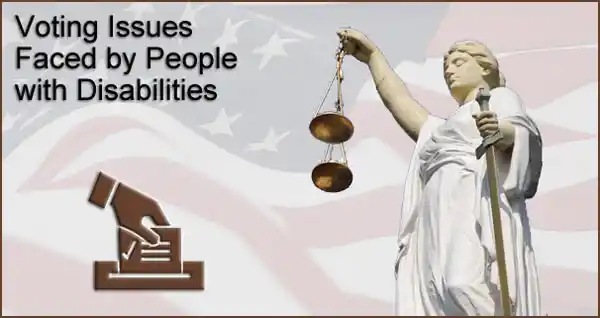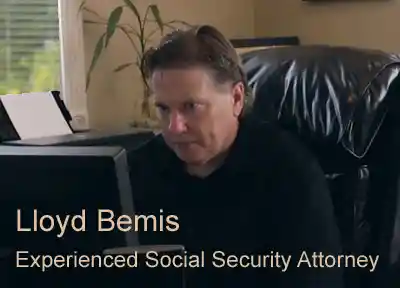Voting Issues Faced by People with Disabilities
For those with disabilities, the simple act of voting can be unnecessarily difficult.
Author Attorney Lloyd Bemis:
Despite the Americans With Disabilities Act which requires polling places to accommodate disabled voters, many polling places are still not accessible for people with disabilities.

Despite the Americans With Disabilities Act which requires polling places to accommodate disabled voters, many polling places are still not accessible for people with disabilities.
According to the Federal Election Commission, more than 20,000 polling places across the United States are inaccessible, and in a survey taken after the 2012 Presidential election, 30 percent of disabled voters had some kind of difficulty voting.
Common problems the disabled voter faces are:
- Polling booths are often situated in church basements or in upstairs meeting rooms with no ramp or elevator for access
- Doorways are too narrow to accommodate wheelchairs
- Ramps are too steep
- Concrete walkways are cracked, inhibiting navigation
- There is little or no disabled parking
- Standing in line for a long period of time
- Trouble writing on a ballot
- There is no Braille ballot so a blind person has to be accompanied by someone they trust to follow instructions and help cast the ballot
- A disabled person may have trouble reading a ballot or manipulating a polling machine
Another problem the disabled voter may encounter is poorly trained poll workers who may deter a disabled person from voting.
The poll worker may question the eligibility of a disabled person with a cognitive disability or may not recognize a disability. For example, a poll worker might think someone with cerebral palsy is drunk.
If you have been denied disability benefits don’t give up! Contact a Disability lawyer at 512-454-4000 for a free consultation and get the benefits you deserve.
The National Voting Rights Act was enacted in 1993 to enhance voting opportunities for every American.
This Act requires states to provide each citizen with opportunities to vote by three different means:
- A person may register to vote when they apply for a driver’s license or renew a license. A state is also required to forward each application to the state’s designated election official.
- Section 6 of the Act allows citizens to register by using mail-in forms developed by the states and the Election Assistance Commission.
- States are required to offer voter registration opportunities at all offices that provide state-funded programs, primarily those agencies engaged in providing services to disabled applicants. Applicants must be provided with a voter registration form as well as assistance in completing the form.
Unfortunately, only 54 percent of non-profit disability agencies are meeting the above requirements and 69 percent do not offer voter registration at intake.
31 percent have not even heard of NVRA. The best strategy to remedy this problem may be for state agencies that fund disability programs and agencies, or the Secretary of State, to inform disability agencies of their legal obligations.
Although the Americans with Disabilities Act increased accessibility of polling places by defining space for walkways and parking, it did not address issues for voters with visual, auditory, or cognitive disabilities.
The Help America Vote Act of 2002 states that each polling place must have at least one voting machine to help the blind and visually impaired and must provide users with privacy and independence. People with disabilities want to vote, but because they are essentially “locked out” by these deterrents they stay home. One study showed that people with disabilities are 20 percent less likely to vote than non-disabled people and 10 percent less likely to register to vote. As a result, disabled voters often feel that no one really cares if they vote.
Washington D.C. is one city attempting to provide remedies to problems disabled voters face and make polling places more accessible.
Some of the changes the city has implemented are:
- Installing new voting machines that are adjustable for wheelchairs
- Providing instructions in Braille
- Installing special attachments and control pads to make voting machines easier to operate
- Staffing each precinct with workers whose sole responsibility is to assist the disabled and elderly.
While some solutions may seem costly, other modifications are really quite simple.
A polling place can move trash bins and other obstacles to entryways, or provide chairs for those voters who are unable to stand in line.
One of the top priorities of the American Association of People with Disabilities (AAPD) is increasing the political power of the disabled through its REV Up Campaign.
REV UP stands for Register! Educate! Vote! Use your Power! AAPD works with state and national organizations “to eliminate barriers to voting, promote accessibility of voting technology and polling places; educate voters about issues and candidates; promote turnout of voters with disabilities across the country; engage candidates and the media on disability issues, and protect eligible voters’ right to participate in elections.”
As a voter with a disability, you have the right to:
- Vote privately and independently
- Have an accessible polling place with voting machines for voters with disabilities
- Wheelchair-accessible voting booths
- Entrances and doorways that are at least 32 inches wide
- Handrails on all stairs
- Voting equipment that is accessible to voters who are blind or who have low vision
- Bring your service animal with you into your polling place
- Seek assistance from workers at the polling place who have been trained to use the accessible voting machine
- Bring someone to help you vote (including a friend, family member, caregiver, assisted living provider, or almost anyone else, but not your employer or union representative).
March primaries are around the corner with the first day of early voting on Tuesday, February 20, 2018 and the last day to apply for a ballot by mail is Friday, February 23, 2018.
More important dates can be found at https://www.sos.state.tx.us/elections/voter/2018-important-election-dates.shtml. Exercise your political power and vote. By doing so, you help not only yourself, but other people with disabilities.
Disability benefits are an important source of income for those who are unable to work. If you not able to work due to accident or illness, you may be eligible for Social Security Disability or Long Term Disability benefits. If you have applied for benefits and been denied, contact the attorneys at Bemis, Roach and Reed for a free consultation. Call 512-454-4000 and get help NOW.
Medicare- The Two Year Waiting Period (Part 1)
Prudential and filing Long-term Disability Insurance Appeals
Disability Insurance – an Important Policy to Carry for Individuals


Your Free Initial Consultation
Call now:
At Bemis, Roach and Reed, if we can't help you, we will try to find the right attorneys for you.
We offer each of our prospective clients a free no obligation one hour phone or office consultation to see if we can help you and if you are comfortable with us. We know how difficult a time like this can be and how hard the decisions are. If we can be of assistance to you and help you find a solution to your issue we will even if that means referring you to another attorney.
Let's get you Started:
If you could provide us with some basic information about your claim we will get right back with you with a free case evaluation and schedule your Free Consultation Today.






